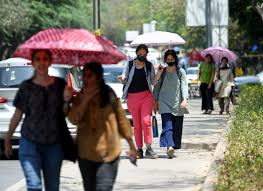Dr. Aparna Sharma
Maharashtra is currently in the grip of a severe heatwave, with temperatures crossing 43°C in many regions including Nagpur, Chandrapur, Jalgaon, and parts of Marathwada and Vidarbha. As the mercury rises, so does the risk of dehydration, heat exhaustion, sunstroke, and even life-threatening heatstroke. It’s not just uncomfortable — it can be dangerous. But with the right steps, you can protect yourself and your loved ones.
This heatwave isn’t just seasonal discomfort — it’s a serious health emergency. With simple but consistent steps, you can avoid falling sick and help others stay safe too. Stay indoors when possible, keep yourself cool and hydrated, and pay attention to your body’s signals.
Here’s how to take care of your health during this intense summer spell.
The most important rule during a heatwave is to stay hydrated. Drink water frequently, even if you don’t feel thirsty. Your body loses water faster than usual in such heat, so it’s essential to keep replenishing.
Include ORS, lemon water, coconut water, and buttermilk in your daily intake. These not only hydrate but also restore essential salts. On the other hand, avoid alcohol, fizzy drinks, and excess tea or coffee as they can actually dehydrate your body.
What you wear can make a big difference. Stick to light-colored, loose-fitting cotton clothes that allow your skin to breathe. Use an umbrella or cap when outside, and don’t forget sunglasses and sunscreen to protect against UV damage.
It’s best to stay indoors between 12 PM and 4 PM, the hottest part of the day. If you must step out, try to walk in the shade and carry a bottle of water with you.
Your food habits need to change during summer. Eat fresh, seasonal fruits like watermelon, muskmelon, and cucumber. These are high in water content and help cool the body. Choose light, home-cooked meals over oily or spicy food, which can increase body heat.
Avoid street food and uncovered items that may be contaminated. Food poisoning and stomach infections are more common in hot weather.
Keep your home as cool as possible. Draw curtains, especially on windows that get direct sunlight. Use fans, coolers, or air conditioning where available. If not, simply placing wet curtains or keeping indoor plants can help reduce the temperature.
Take cold showers or wipe your body with a wet towel to stay cool.
The elderly, children, and those with chronic illnesses are most vulnerable during a heatwave. Make sure they’re drinking enough water and staying indoors. Infants and toddlers should be kept in shaded, well-ventilated rooms and dressed in light clothing.
It’s crucial to know the early symptoms of heat-related illness. Fatigue, dizziness, rapid heartbeat, dry skin, nausea, confusion, or fainting could signal heat exhaustion or heatstroke. If someone experiences these, move them to a cool place immediately, offer fluids, and seek medical help without delay.
Don’t schedule heavy workouts or physical activities during the day. Never leave children, elderly people, or pets in parked cars — even for a few minutes. Don’t rely only on cold drinks or soda for hydration; they don’t restore lost electrolytes.
















